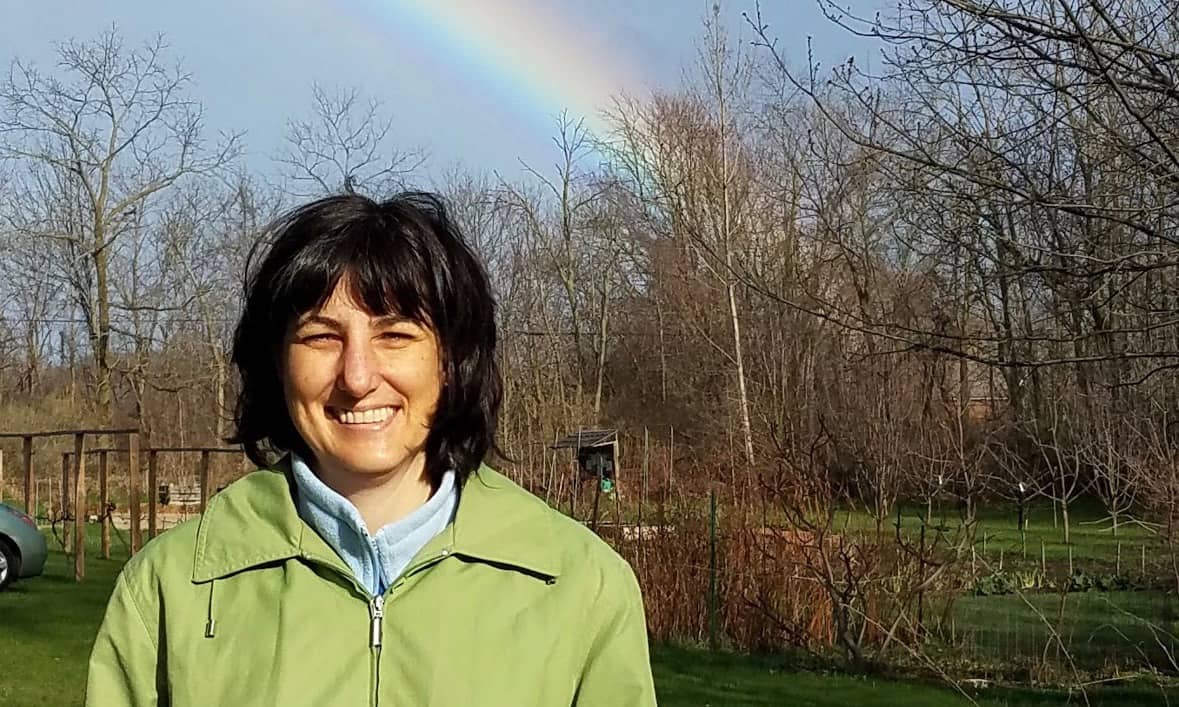As a part of TJP’s effort to highlight the voices of women in the Church, we recently spoke with Sister Rejane Cytacki. Sr. Rejane is a Sister of Charity of Leavenworth, KS and the Executive Director of the Eco-Justice Center in Racine, WI. She spoke to us about eco-justice, her vocation, and the future of religious life.
Could you tell us a bit about your community?
I am a Sister of Charity of Leavenworth and have been a part of that community for
13 years. I professed my perpetual vows in 2013. We are about 200 women. We were founded by Mother Xavier Ross in 1858, and we trace our roots to St. Vincent de Paul and Louise de Marillac.
And you’re currently working at an Eco-Justice Center. What does this ministry include?
The Center is a sponsored ministry of the Racine Dominicans and we are modeled off of the White Violet Eco-Justice Center. Our mission is environmental education centered around the values of community, contemplation, creativity, and cultivation. We have 15 acres and are a small working farm with 8 types of animals and lots of garden space for vegetables and flowers. We have renewable energy: solar, wind, and geothermal and are 50 percent off the grid. We offer a variety of field trips, summer camps, and a high school Farm Corps program to teach students how to grow, plant, harvest, cook, and sell at market fresh produce.
We are two miles south of a coal plant, and there have been issues in the neighborhood with coal dust and health problems. So we have also been active with Clean Power Coalition in Southeast Wisconsin, pushing for renewable energy.
How has your passion for the earth and eco-justice been connected with your vocation as a Catholic Sister?
After college, I did a year of volunteer work with the Passionist priests and brothers. I also spent time with the Passionist nuns in Clark Summit, PA. I was 22 and spent a summer working in their organic garden with Sr. Gail Worcelo. I fell in love with that context of introducing people to the earth and creation. I found that you can have spiritual and contemplative connections toward it. Sister Gail is also one of the founding sisters for the Sisters of Earth, a group, mainly of Catholic sisters, who do eco-justice work and founded the Green Mountain Monastery.
At the time, I wasn’t actively looking at religious life. But when I was there, I asked myself if I could be a sister. It was clear that monastic life was not for me, I was too young, and I hadn’t dated enough. So, I moved back home to volunteer with a Catholic Worker for two years.
The Sisters of Charity had a strong presence at the Catholic Worker. I joined an intentional living community with other lay women the sisters to share prayer and community. I was attracted by their vitality, joy and work with the poor. After a few years, I said yes to becoming a sister. After I entered, I continued to teach but also did a lot of work with school gardens. My community eventually asked me to do a Master’s degree in Earth Literacy.
What is the role of contemplation in eco-justice work?
We have a hermitage on our property. It is a very simple one room cabin. And we have a wooded part of property that includes a labyrinth. We use the labyrinth a lot for programming, for field trips and for summer camps. When Catholic groups come, we talk about forms of prayer. For non-religious groups, we talk about contemplation. We try to help people reflect on their life. We give a space for students to be quiet and listen. A seventh grader once told me after she went through the labyrinth, “I think that’s the first time I’ve ever heard myself think.”
Contemplation is one of our core values and it cuts across any faith tradition. It is necessary in our world. We have all this technology to keep us connected and yet people of all ages are feeling more disconnected than ever. We can just look at the suicide rates to see that as evidence. Technology is not meeting our inner needs or even our social needs. We need to take time for quiet, to hear ourselves think. We need time to reflect on where we are going and where we have been. All of this will help us gain insight, self-knowledge, and help us understand other people better and where they are coming from.
What are some of the unique gifts that Catholic sisters bring to the Church and to the world?
Contemplative dialogue- listening to both sides. Holding on to the paradox of hope as we live through Good Friday (the diminishment of the Religious sisters) into Easter Sunday (the rebirth and rekindling of religious life of the future).
What does the “rebirth and rekindling of religious life of the future” mean?
Sr. Julia Walsh, FSPA recently wrote, “I don’t remember where I heard it or where I read it, but it’s been rattling around in my mind a lot lately that the healthiest and holiest people are the folks that are conscious of the power of paradox. These good ones can love those they disagree with and want goodness for those who have harmed them. They are the saints who can hold two contradictory truths together, who aren’t threatened by inconsistencies.”
I think that holding two contradictory truths together is the paradox of Good Friday and Easter Sunday. Death and life, diminishment and rebirth. Membership in religious communities and the Church in general is passing away. We hold their stories, we hold their histories, we hold their faith. We are grounded in that and it has formed us. The diminsment is painful and we grieve. But when we stay with Jesus as the model, we know there is Resurrection. New life comes from death. We see that in nature and in our Gospels. You have to stay with it and you can’t run away. Something beautiful will be reborn for religious life and for the Church. We just don’t know what it is. It is a paradox, but life is full of them.
You’re a part of Giving Voice. Can you tell us bit about that group and its function? 1
Giving Voice began almost 20 years ago. Younger women religious decided to come together because they were entering communities by themselves or with very small groups and wanted some peer support. In the beginning, we got together for a retreat once a year and started an annual national gathering. We established some deep relationships. As a group, we are growing up together in religious life. Some sisters recently published a book together entitled In Our Own Words.
This organization has given me so much in the way of walking in the unknown together. I’ve formed relationships with a diverse group of sisters from so many congregations all over the world. It has given me great hope for the future of religious life.
What wisdom or encouragement would you give to women discerning religious life?
For women discerning religious life, prayer is where you have to start. You have to develop a relationship with God. Then, look around for communities nearby where you can visit and step out of your comfort zone. Look for communities that have joy and life in their membership and have faith and hope in the future. Look into their charisms and see what resonates with you. Pay attention to how you feel when interacting with sisters and communities. It is about being accepted for who you are, for your gifts and talents. Then it will feel like a home.
Don’t think you need to do all this homework, start with prayer. The Holy Spirit will help you find where you should be. It will also be helpful to find a Spiritual Director. You can also reach out to Giving Voice.
Finally, what are some tips for those trying to live with greater intention in their care for creation?
Start small. It has to go beyond recycling. Start with using cloth bags, bringing your own Tupperware to restaurants for your leftovers, refusing plastic straws at restaurants. Bring your own silverware, plates, and water bottles to potlucks to keep plastic ware, paper plates and plastic bottles out of landfills. Then start reading articles online or find a book list to help get you thinking about our relationship to rest of earth. A great book right now is “The Hidden Life of Trees.”
- The mission of Giving Voice is to be “A peer led organization that creates spaces for younger women religious to give voice to their hopes, dreams and challenges in religious life.” ↩


